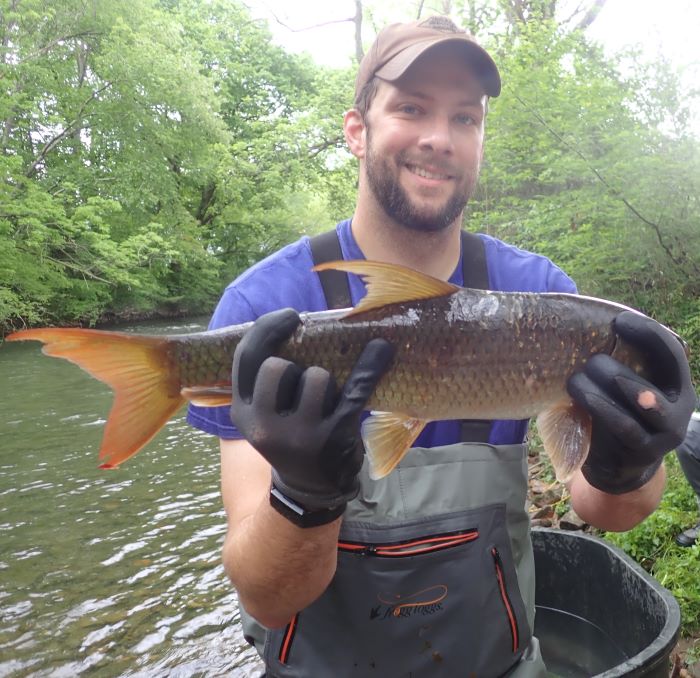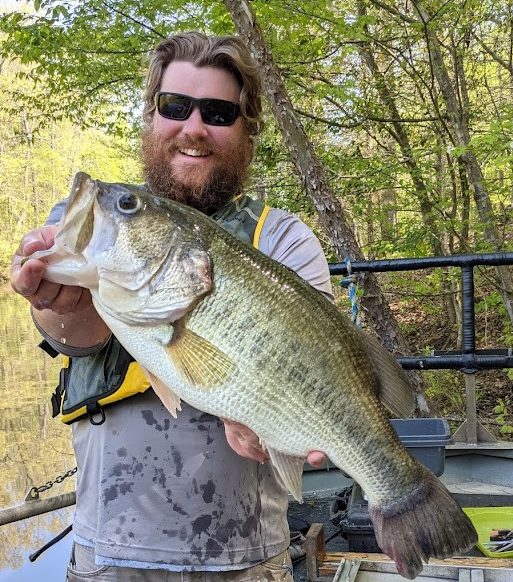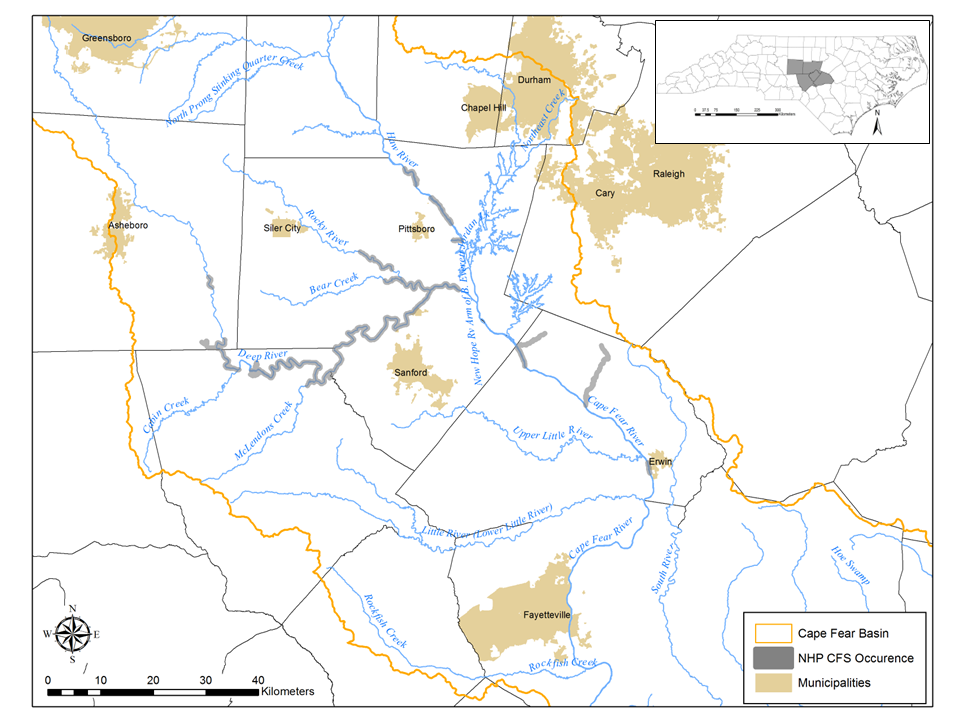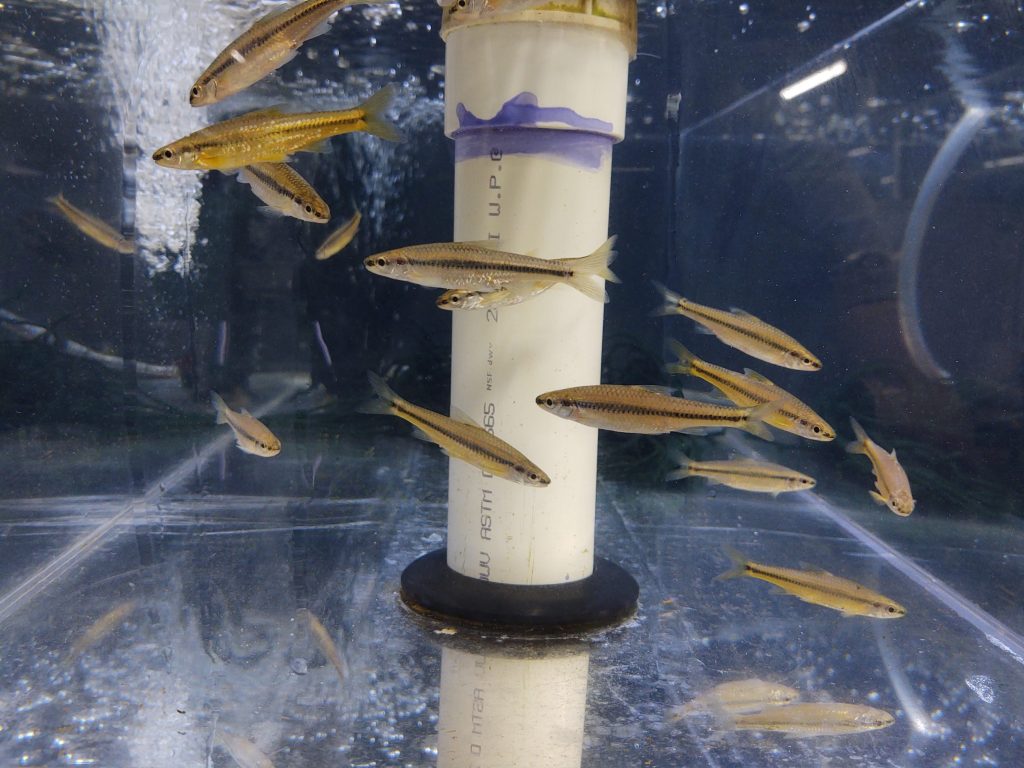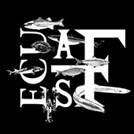Winter 2022 Newsletter

Quick Content Links
- President’s Message
- Treasurer’s Report
- 2023 NCAFS Annual Meeting
- 2023 President-Elect Ballot
- Cape Fear Shiner Augmentation
- Winter Updates from the East Carolina University Student Subunit (ECU-AFS)
- NCAFS Supports the Hutton Junior Fisheries Biology Program
- SDAFS Technical Committees
- Good Work! – Recent Publications by NCAFS Members
- Stories of Interest
- Call to Action!
- Valuable Links
President’s Message
We’re coasting into the holidays, and I’m reflecting on all of the good work of this year that I’ve been lucky to help accomplish. One thing I recognize is that we aquatic folk are passionate and dedicated, putting a whole lot of heart into what we do. I’m so thankful for colleagues like you – we inspire and challenge each other to be better biologists and often make each other laugh.
Last month, your Executive Committee reviewed a fine set of NCAFS funding requests. We awarded grants to three well-deserving projects:
- Matt Damiano (NC State University) received $1,000 to support work to identify broad-scale drivers in spatiotemporal patterns from fishery-independent video data with support vector machines. This work is being done by undergraduate students, who are gaining graduate-level research experience that will result in a peer-reviewed publication.
- Lily Hughes (representing the Friends of the NC Museum of Natural Sciences) received $981 to assess the quality and quantity of DNA in tissue from archival specimens in the state museum ichthyology collection. This project is providing training to an undergraduate student in molecular laboratory techniques.
- Luke Etchison (NC Wildlife Resources Commission) received $1,000 to support the Blue Ridge Snorkel Trail, an educational project that will link together a set of publicly accessible river sites where people can safely snorkel in western NC.
Stay tuned – each of these projects will be presented at our NCAFS annual meeting in Durham in February 2023. In January, I’ll be sending out two additional funding requests for greater than $1,000 to NCAFS membership for your review; we’ll discuss and vote on whether to fund these requests at our next NCAFS business meeting at our annual meeting.
Here’s to peace and joy for all this holiday season.
Andrea
Submitted by Andrea Leslie, NCAFS President
Treasurer’s Report
Balances as of December 15, 2022:
NCAFS Wells Fargo Checking Account: $9,290.04
Robust Redhorse Conservation Committee Fund: $7,125.25
Edward Jones Ichthus (Student) Fund: $30,177.45
Edward Jones General Fund: $73,074.24
NCAFS recently awarded funding to several members’ projects, and we look forward to hearing more about these projects at the 2023 meeting! For more information on funding awards, both those already awarded and several to be voted upon at the February meeting, please see the President’s Message in this month’s newsletter. We encourage groups or individuals to apply for project funding! Our next round of funding will occur in Spring 2023 with a deadline of April 1. Application information can be found here.
It’s time to pay your dues! As a reminder, the ways dues can be paid are as follows:
- Online with your registration for the meeting,
- Online through our website anytime (online membership form here),
- Through AFS when you renew your AFS membership,
- Via mail by sending the membership form and a check or cash (preferably check) – mailing information provided by emailing Casey, or
- In person at the meeting via cash or check.
Please consider being a member of the parent society, this benefits our chapter greatly!
For questions regarding finances, donations/awards, or procedures, please contact Casey Joubert at [email protected].
Hope to see you all in Durham!
Casey
Submitted by Casey Joubert, NCAFS Secretary-Treasurer
2023 NCAFS Annual Meeting
Registration is now open for the 2023 Meeting of the NC Chapter of the AFS in February! Please visit our website to register. Don’t forget to renew your membership for lower registration costs and for the opportunity to vote in the upcoming elections. Early registration is $75 for members, $95 for non-members, and $50 for students or retirees. Workshop registration is $20 for members, $25 for non-members and FREE for students. Deadline for early registration ends Feb 6, 2023. A late fee of $10 will be added to all registration costs after this date.
Please visit the website for information on the schedule, abstract submission, lodging, and undergraduate travel assistance.
Submitted by Kelsey Roberts, NCAFS President-Elect
2023 President-Elect Ballot
The Nominations Committee is pleased to present the NCAFS ballot for 2023 President-Elect. Please take a moment to evaluate the candidate sketches and cast your vote on the electronic ballot when it opens (you will be notified by email when the poll is active). Remember, you must be an NCAFS member in good standing in order for your vote to count. In addition, all valid voters will be entered in a drawing to win a year of AFS membership ($100 value)! Results will be announced at the 2023 NCAFS Business Meeting on February 22nd. Good luck to each candidate!
Luke Etchison
Luke Etchison is the Western Region Aquatic Wildlife Diversity Coordinator for the Wildlife Resources Commission. Luke is responsible for conservation and monitoring of imperiled mussels, crayfishes, native fishes, and aquatic snails in six river basins in western NC.
Luke received a B.S. in Aquatic and Fisheries Biology (2010), M.S. in Aquatic Biology (2012), and a Ph.D. in Environmental Science (2018) with a focus on fish ecology and habitat from Ball State University. Before starting with NCWRC in 2016, Luke was a GIS Biologist for FL Fish and Wildlife Conservation Commission where he was part of the Habitat Assessment and Restoration (HARP) Program that focused on management of habitats on Wildlife Management Areas across Florida.
Luke has regularly participated in national and local chapter meetings since 2009 and joined NCAFS in 2015. Luke hopes his passion for all aquatic critters can help end the dichotomy between game and non-game species values. Luke spends his free time hiking, river snorkeling, dinking in pickleball, and mushroom hunting.
Seth Mycko
Seth Mycko is the District 5 Fisheries Biologist II for the Wildlife Resources Commission. In his role with the Commission, Seth manages sport fish species in the north central Piedmont lakes and rivers along the I-40 corridor. He received his B.S. in Wildlife and Fisheries Management from Clemson University in 2013. He then worked for the SC Department of Natural Resources for a few years as a fisheries technician before returning to Clemson for his M.S. studying Smallmouth Bass in the Broad River. After M.S. completion in 2017, he successfully interviewed for the District 5 Biologist I position and has been in District 5 ever since.
Seth has participated at various levels of AFS for many years. In 2012, he re-started the Clemson AFS student subunit after its long pause due to lack of interest and served as subunit president in 2012. Additionally, he has served as the chair of the NCAFS Education and Outreach Committee for 2 years. Seth enjoys spending his free time bass fishing the Triangle reservoirs and competing against other area anglers in local bass fishing tournaments.
Submitted by Ryan Heise, NCAFS Past-President
Cape Fear Shiner Augmentation

Tempering juvenile Cape Fear Shiners to Cape Fear River water before release. (L-R) Brena Jones (NCWRC), Jennifer Archambault (USFWS), Kendall Williams (NCWRC), Brandi Symons (USFWS). Photo credit: Sonia Mumford.
The Cape Fear Shiner Notropis mekistocholas is a rare and beautiful minnow species endemic to the upper Cape Fear River Basin in North Carolina. These fish were relatively recently described in 1971 (Snelson) and were federally listed as Endangered shortly thereafter, in 1987. Their preferred habitat consists of run/riffle/pool complexes in the mainstems and lower ends of tributaries of the Deep, Rocky, Haw, and Cape Fear rivers. While populations persist, across their range, habitat fragmentation due to dams, along with water quality degradation have both posed significant challenges to movement and gene flow between habitat patches. This makes it difficult for shiners to repopulate patches on their own when numbers decline in a sub-population.
To give the fish a boost towards recovery, the NC Wildlife Resources Commission (NCWRC), in partnership with the US Fish & Wildlife Service (USFWS), has implemented a population augmentation program. Status surveys conducted by the NCWRC in 2007 and 2020 revealed that Cape Fear Shiner densities in the Haw and Cape Fear rivers were extremely low, as compared to numbers seen in the Deep and Rocky rivers. Biologists from the NCWRC’s Aquatic Wildlife Diversity (AWD) program worked with staff from the USFWS Edenton National Fish Hatchery to collect broodfish from strong shiner populations in the Deep River in spring 2022 and transport them to Edenton. There, the fish were temporarily held and allowed to spawn in captivity. The resulting fry were grown out until late fall to give them a size boost before returning them to the wild. The broodfish were returned to the Deep River in the fall to give them another opportunity to spawn on their own the following spring.
In October of 2022, we accomplished the first release of a batch of 500 juvenile Cape Fear Shiners into the mainstem of the Cape Fear River. While this is only the first of multiple planned production years, we have already learned a great deal about growing and spawning healthy Cape Fear Shiners in a hatchery setting. As I watched our young shiners find their bearings during their first moments in the wild, even though I knew not all of them would survive, I hoped that what I witnessed was only the beginning of more frequent sightings of these stunning golden fish.
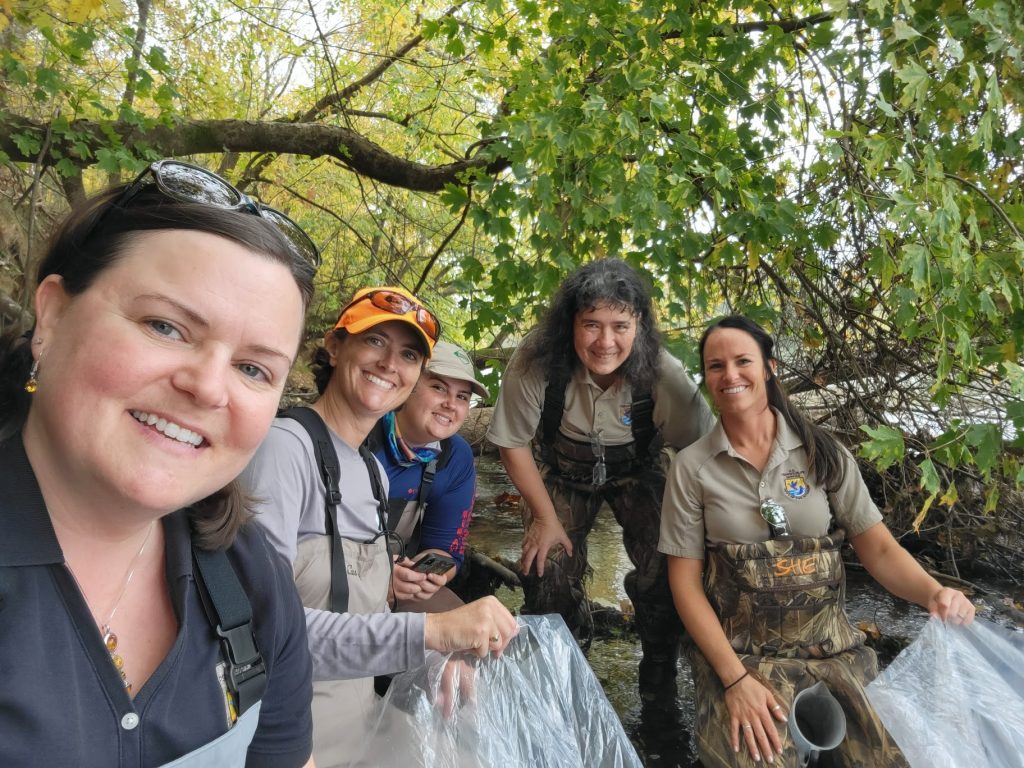
The release crew: (L-R) Jennifer Archambault (USFWS), Brena Jones (NCWRC), Kendall Williams (NCWRC), Sonia Mumford (USFWS), Brandi Symons (USFWS). Photo credit: Jennifer Archambault.
Submitted by Brena Jones
Winter Updates from the East Carolina University Student Subunit (ECU-AFS)

ECU AFS members encouraging undergraduate research involvement at the What’s Up Bio Event. (L-R) Dr. Rebecca Asch, Chase Spicer, Caitlin McGarigal.
Greetings from the East Carolina University (ECU) Student Subunit of the American Fisheries Society. This winter we would like to share some of the exciting events that our subunit hosted this past fall. Like most subunits across the country, our group was still experiencing the effects of reduced membership and in-person involvement due to the lasting effects of COVID. To recruit new members, we got involved in several recruitment and outreach events across campus. Since then, student involvement and new memberships have been on the rise. One of our goals this semester was to increase membership in our subunit with a focus on undergraduate involvement.
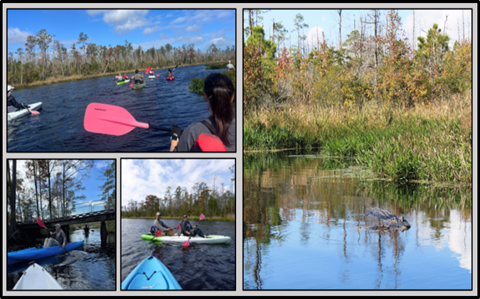
Dr. Jim Morley navigates through a bridge on the river. Top Left: Members kayak across Sawyer Lake. Right: American Alligator basks in the morning sun on Sawyer Lake. Middle: Chase Spicer and Maggie Shostak navigate the National Wildlife Refuge the best way pirates know how – on the water!
Kayaking With ECU AFS
In October, the ECU Subunit hosted a kayaking trip to the Alligator National Wildlife Refuge in East Lake, N.C. Group members launched their kayaks in Buffalo City. We got to see plenty of wildlife while exploring the refuge by kayak. Members were truly fortunate to see plenty of alligators basking in the warm October sun. No ECU pirates were captured by any alligators!
A Trip to the Pier
In November, the ECU subunit hosted a fishing trip to the OBX. It was a fantastic opportunity to teach members about fishing as many were first-time anglers. Our members traveled to Jennette’s Pier located in Nags Head, N.C. While conditions were tough for fishing due to the aftereffects of Hurricane Nicole, our members still managed to catch lots of fish! We also had a great time learning about the research going on at the pier that is being conducted by the Coastal Studies Institute and The North Carolina Aquarium. We would like to send a big thank you to the folks at Jennette’s Pier for allowing us to come out and experience the pier and the Outer Banks! We look forward to hosting more events in the spring that are both educational and get students interested in the outdoors.

Sarah with a silver perch, Bairdiella chrysoura. Chase with a clearnose skate, Raja eglanteria. HyeSook with a Spot, Leiostomus xanthurus.
From all of us here at AFS Subunit at East Carolina University, we wish you a happy holiday season and a prosperous fishy New Year!
Submitted by Chase Spicer, ECU-AFS President
NCAFS Supports the Hutton Junior Fisheries Biology Program
Hutton student applications are now open! The Hutton Junior Fisheries Biology Program offers rising high school juniors, seniors, and graduated seniors an 8-week paid internship working closely with a fisheries professional (freshwater or marine!). We have professional mentors across the country that host a variety of internship experiences. Student applications close February 14, 2023. If you know a student that you think would benefit from this program, please encourage them to apply!
Are you interested in applying to be a Hutton Mentor? Want to learn best practices for hosting high school students and how to offer them an exciting and engaging summer internship? Watch a webinar hosted by three past Hutton Mentors about their tips and advice for all interested Hutton Mentors – first time and past! Mentor Applications close on March 1, 2023.
For more information and copies of flyers, please visit https://hutton.fisheries.org/recruitment-101/ or contact Ashley Berniche, Education Program Coordinator [email protected]
If you are interested in providing mentoring fisheries field experience for potential Hutton applicants yet cannot commit the full 8 weeks to be a Hutton mentor, please let Kevin Dockendorf know and provide him with number of days, activity, field location, and duty station. Kevin will compile this information and prepare for Ashley to consider for potential Hutton applicants from North Carolina.
Submitted by Kevin Dockendorf, NCAFS Mentoring Committee Chair
SDAFS Technical Committees
The Southern Division of the American Fisheries Society conducts much of its work through technical committees. A primary function of these committees is to disseminate information throughout the division, and committees frequently sponsor symposia, compile proceedings, and work towards broader research and management initiatives throughout the region. Although anyone is permitted to attend the in-person meetings that typically coincide with the SDAFS annual meeting, the committees are comprised of at least one representative from each state, with representatives appointed by the state agency fisheries chief.
If you would like to share information about a project with one of the committees, please contact the technical committee representative listed below who best aligns with your project.
Aquaculture – David Deaton ([email protected])
Catfish Mangement – TD VanMiddlesworth ([email protected])
Morone – Kelsey Roberts ([email protected])
Pollution – Ben Ricks ([email protected])
Reservoirs – Lawrence Dorsey ([email protected])
Small Impoundments – David Belkoski ([email protected])
Trout – Jake Rash ([email protected])
Warmwater Streams – Kyle Rachels ([email protected])
Submitted by the NCAFS Newsletter Review Team
Good Work! – Recent Publications by NCAFS Members
Brownstein, C., D. Kim, O. Orr, G. Hogue, B. Tracy, M. Pugh, R. Singer, C. Myles-McBurney, J. Mollish, J. Simmons, S. David, G. Watkins-Colwell, E. Hoffman, and T. Near. 2022. Hidden species diversity in an iconic living fossil. Biology Letters DOI 10.1098/rsbi.2022.0395
Jones, B., C. Kowalchyk, K. Pacifici, and Z. Clark. 2022. Modeling Abundance and Detection Probability and 2020 Status Report for the Cape Fear Shiner Notropis mekistocholas. Final grant report for USFWS, Raleigh, NC. Available from authors.
Rudershausen, P., F. Cross, B. Runde, D. Evans, W. Cope, and J. Buckel. 2023. Total mercury, methylmercury, and selenium concentrations in blue marlin Makaira nigricans from a long-term dataset in the western north Atlantic. Science of the Total Environment DOI 10.1016/j.scitotenv.2022.159947
Submitted by the NCAFS Newsletter Review Team
Stories of Interest
Mola washes ashore at Topsail Beach
A few NCAFS members get their hands on a big sunfish
North Carolina’s New River Basin Fish Fauna
An NC river is at the forefront of the rights-of-nature movement
Changing a River’s Course
A push to recognize that NC’s natural resources should have rights
Mattamuskeet under siege
Kevin Dockendorf discusses plans to reduce carp biomass
Alaska crab fishery collapse
Fisheries closures causing significant economic hardship
Columbia River basin tribes promised they would always have fish
Contamination poses significant health risks to fish consumers
Submitted by the NCAFS Newsletter Review Team
Call to Action!
If you want to contribute, have a story idea or would like us to include something in next quarter’s newsletter, email Kyle Rachels at [email protected] or give him a call at 252-548-4938.
Also, if you want to become more involved with one of the many great NCAFS committees then please check this link for information about each one, contacts, etc., https://nc.fisheries.org/who-we-are/committees/
 Valuable Links
Valuable Links
The American Fisheries Society Home Page offers a wealth of links to assist you in your fishy endeavors. This and archived NCAFS newsletters, along with links, chapter information, and upcoming meetings, can be found here on our own website.


